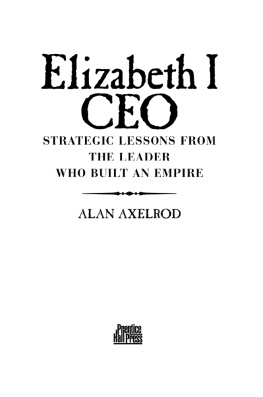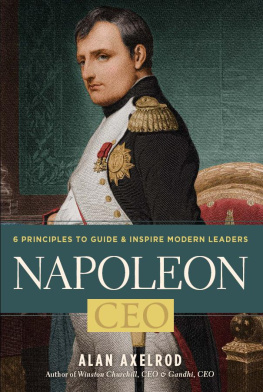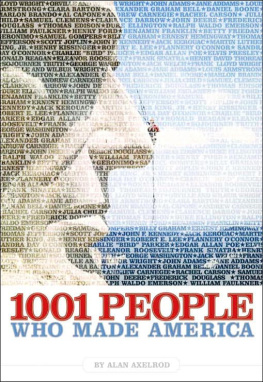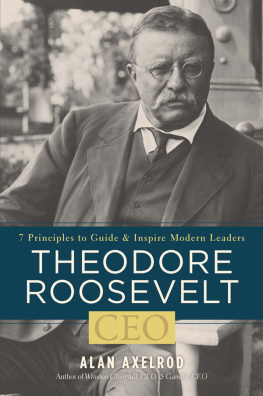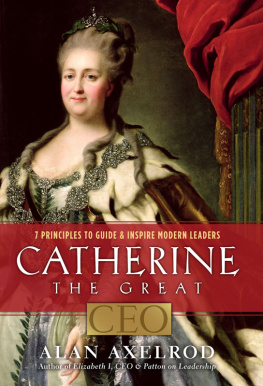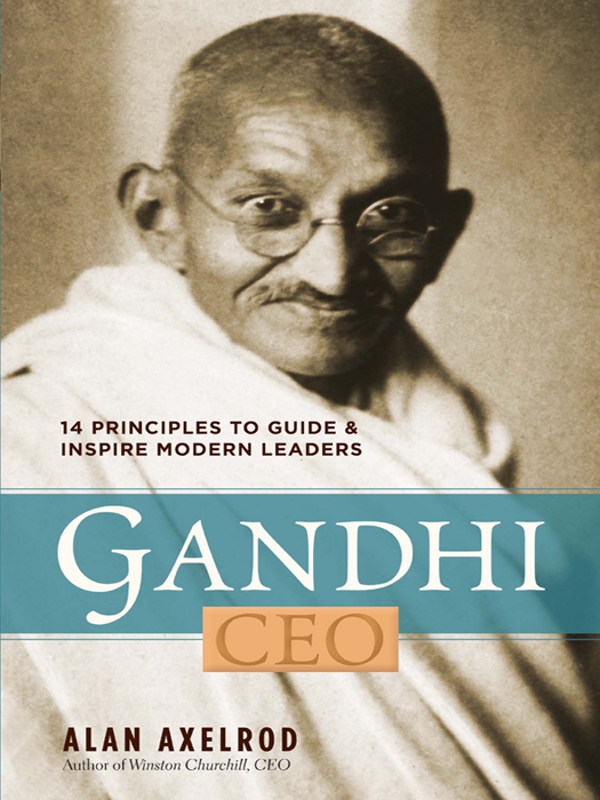
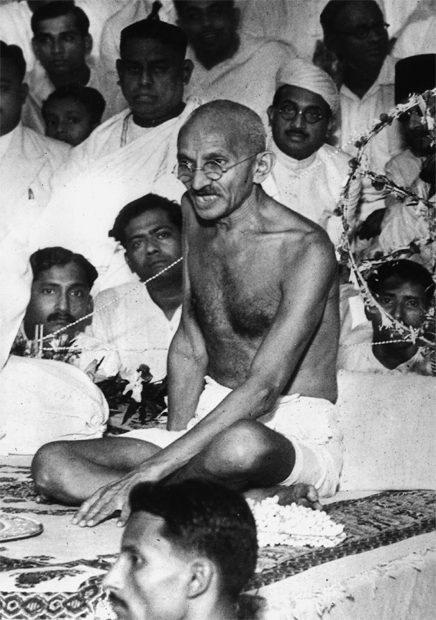
GANDHI, CEO

14 PRINCIPLES TO GUIDE &
INSPIRE MODERN LEADERS
ALAN AXELROD

New York / London
www.sterlingpublishing.com
STERLING and the distinctive Sterling logo are registered trademarks of Sterling Publishing Co., Inc.
10 9 8 7 6 5 4 3 2 1
Published by Sterling Publishing Co., Inc.
387 Park Avenue South, New York, NY 10016
2010 Sterling Publishing Co., Inc.
Text 2010 by Alan Axelrod
Distributed in Canada by Sterling Publishing
c/o Canadian Manda Group, 165 Dufferin Street
Toronto, Ontario, Canada M6K 3H6
Distributed in the United Kingdom by GMC Distribution Services
Castle Place, 166 High Street, Lewes, East Sussex, England BN7 1XU
Distributed in Australia by Capricorn Link (Australia) Pty. Ltd.
P.O. Box 704, Windsor, NSW 2756, Australia
Manufactured in the United States
All rights reserved
Sterling ISBN 978-1-4027-5806-5
For information about custom editions, special sales, premium and corporate purchases, please contact Sterling Special Sales Department at 800-805-5489 or .
Frontispiece: Mahatma Gandhi tries to settle a Congress Party dispute in Calcutta, India, in 1934. (Associated Press)
Right: Shutterstock/Albert Campbell

CONTENTS
Generations to come will scarce believe that such a one as this ever in flesh and blood walked upon this earth.
Albert Einstein
It is surprisingly easy to believe in the miracles of sainthood, but very hard to believe in those of flesh and blood, the prodigies of leadership that transform the world and the way we see and move and act in the world. Yet, as Gandhi himself taught, these are not miracles at all. They are necessary actions, the works any people, any nation, any enterprise must successfully create, not to achieve the supernatural or merely to survive, but to evolve, to grow, and to prosper.
There is no doubt that Gandhi was a good man and an intensely spiritual man, but he was also a manager and executive, a supremely practical leader for change. Brought up in the Hindu merchant caste, he applied the principles of the Hindu faith and Jain tradition to the challenges of living. He came to believe that truth, tolerance, sacrifice, joy, and the nonviolent rejection of tyranny were not spiritual or visionary ideals, but the very substance of a successful life that enables, even as it is enabled by, a successful society. Even more, these are the drivers of any worthwhile enterprise, the pragmatic principles which any leader who aspires to sustainablethat is, ethicalsuccess must accept, manage, and master.
But Gandhi? A CEO?
Consider his achievements: He stimulated and enabled the rebirth of India, at the time a dysfunctional, failing enterprise on which the welfare of millions depended, and he redefined the very mediumcivilization, no lessin which that enterprise operated. The means by which Gandhi achieved this included mastering the elements of personal leadership and institutional management, performing a revolutionary analysis of the environment of business as usual, and formulating a strategy for productively breaking out of the all-too-limiting box of conventional thought, outworn tradition, and received wisdom.
Gandhi embodied what today would be recognized as the servant leadership paradigm, which he applied to create an enterprise of utmost efficiency, its objectives and goals sharply defined and rigorously pared down to what mattersand only what matters. For Gandhi, the object was to waste nothing and to reject nothing but untruth, intolerance, and violence. Yet his inclusive approach was focused with laser-like intensity on the essentials, the goals that had to be achieved (as he put it) on a do or die basis. For, ultimately, it is only the do-or-die goals that are worth achieving.
They can never be achieved by coercion. For this reason, Gandhi had to become a virtuoso in the art of persuasion through suasion, continually revealing sacrifice as self-interest, the most powerful motivator of all. The result was a nearly ideal organization that achieved the nearly impossible. And it is our good fortune that the master wrote extensively and with great clarity about his assumptions, his principles, his objectives, his experience, and, above all, his methods, inviting us to learn them and to apply them to any worthwhile collaborative endeavor, no matter how humble or how great.

The history of India can be traced back some nine thousand years, and the history of British India to the early seventeenth century, although the British Rajthe period of colonial ruledid not begin until 1858. A movement for Indian home rule was gathering momentum by the 1880s, and, beginning in the early twentieth century, largely under the leadership of Gandhi, the home rule movement metamorphosed into a drive for full independence. Amid all of this, the rich complexity of Indian cultureespecially the multiplicity of its religionswas and remains, to most Westerners, dazzling if not bewildering. Even the events that were concentrated during the span of Gandhis own active career are remote and unfamiliar to us. As for Gandhi himself, although he was a tireless campaigner who literally walked the length and breadth of the Indian subcontinent, he was an astoundingly prolific author and letter writer, the modern edition of his complete works running to one hundred volumes.
To adequately study the life and work of Mohandas Gandhi requires, as it merits, the work of a lifetime. Yet anyone can profit from even a fragmentary acquaintance with his experience and thought. Gandhi, CEO offers an accessible approach between the comprehensive and the fragmentary. From Gandhis lifes work as a leader of change, one hundred lessons have been distilled here into principles designed to inspire and guide the modern and aspiring CEO, manager, or supervisor in building and leading an ethical and profitable enterprise.

Ethical and profitable. There was a timeand not too long agowhen business leaders, if they were being brutally honest with themselves, would have hesitated to utter these two adjectives in the same breath. The most cynical among them believed the two words expressed virtually incompatible attributes of a business, but even the more idealistic CEOs and managers tended to think that ethics were a desirable adjunct to profitsvaluable, to be sure, but an added value, decidedly peripheral, something in the way of a bonus.
That time is over. The worlds economic experience in the first decade of the twenty-first century has demonstrated that, far from being optional in business, let alone incompatible with profit, sound ethics are integral with the processes of commerce and are essential to sustained profitability. Gandhi could have told any businessperson this very thing a hundred years ago, during the first decade of the twentieth century. In this book, he tells us now.




